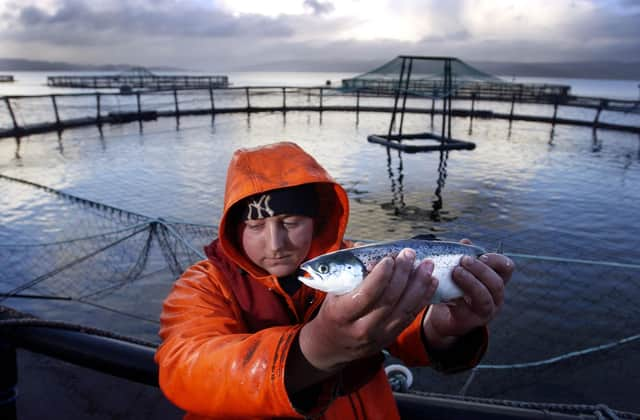Salmon farm licence fees should be used to help Highlands and Islands communities amid soaring house prices – Tavish Scott


Across the Highlands, prices have soared by 162 per cent since 2004, and in Orkney and Shetland they have more than doubled.
Meanwhile, the time it takes for councils to provide housing assistance has also increased. In some places those desperate for help have been left languishing nearly nine months.
Advertisement
Hide AdAdvertisement
Hide AdThis dire shortage of affordable properties means key job vacancies in sectors like farm-raised Scottish salmon but also in crucial public services such as the NHS and the police, cannot be filled, including hundreds of housing shortage-related vacancies on Skye alone.
With people, particularly younger generation, unable to live close to where they work, local economies suffer. This leads to a downward spiral in which fewer people are able to provide jobs, healthcare and schooling.
More than two in five firms on Skye recently reported difficulties hiring employees, with many forced to reduce services or hold back on investment.
Sadly, too, the influx of holiday-home owners has meant residents cannot obtain urgent medical care because health workers are priced off the island.
As Neil Campbell, a retired paramedic and now chairman of Portree and Braes community council, noted, this is because properties “are quickly being snapped up for Airbnb”.
Families looking for affordable housing face the Herculean task of securing a mortgage of up £200,000, along with a hefty deposit.
At Salmon Scotland, our members already play a vital role in keeping many of these coastal communities and local businesses alive.
Our sector directly generates 2,500 professional and high-skilled jobs, with many more across the wider supply chain.
Advertisement
Hide AdAdvertisement
Hide AdOur member companies support thousands of local jobs, but as we continue to grow responsibly, we need more people to join us in looking after our world-leading salmon and continue creating wealth for the rural and national economy.
We also believe our neighbours, the people who live closest to our salmon farms, should be the ones who benefit the most.
There’s a clear route forward, through a Norway-style system where more of the money our farmers pay in licence fees is reinvested in the local communities it comes from.
We want that £10 million-a-year – around half of all fees – to be ploughed back into affordable housing.
Instead of sending all these millions to the Crown Estate in Edinburgh, it would make far more sense for the money to be directly ring-fenced for those coastal areas where salmon farms operate.
Scotland’s current cluttered licensing regime and planned rent hikes means that more than £20 million a year will soon be paid by salmon farmers to different regulators.
Salmon farming currently contributes more than £5 million to the Crown Estate Scotland. This represents more than a fifth of the quango’s revenues and this fee is set to double.
However, due to the recent auction of offshore wind farm licences, the Crown Estate’s overall income is set to soar. Its revenue is set to increase by £70 million due to auctions for offshore wind. Yet there are no details on how – or if – this extra money will be used to help local people in the areas where it is raised.
Advertisement
Hide AdAdvertisement
Hide AdA fairer solution would see a greater share of aquaculture contributions handed back to coastal communities. Much-needed reform of the current regulatory landscape could ensure that money is pumped into local housing.
Rural Affairs Secretary Mairi Gougeon recently commissioned an independent report into the future of sector. In February, Professor Russel Griggs, rightly, recommended a new single licensing payment for salmon.
Crucially, he said this should “address community benefit as well”, echoing the set-up in Norway.
This would mean a “significant amount of what is collected” is returned “to the communities in whatever form so that they can also benefit from the economic prosperity that the farms will bring”. We agree.
Since 2016, money from Norway’s salmon farming licences has poured into its aquaculture fund, Havbruksfondet. Only 20 per cent of the money from fees goes to the state with the lion’s share, 80 per cent, distributed to aquaculture municipalities.
Last year alone, a billion krone (around £86 million) was earmarked for 150 mainly coastal communities to improve social, leisure, and educational facilities.
Like Norway, Scotland should return rents paid to the Crown Estate to the areas where they are generated, rather than money being spent in the Central Belt.
Building homes on the islands has always been an expensive process due to extra costs of materials and labour. New dedicated funding could help alleviate such costs.
Advertisement
Hide AdAdvertisement
Hide AdOur members are at the heart of Scotland’s coastal communities and salmon raised in these waters are renowned at home and abroad. In 50 countries across the globe, salmon from Scotland is an export success adding more than £640 million to the economy every year.
But our continued success rests on ensuring talented professionals can live and work in the areas where these vital jobs are found.
Businesses that can employ more people, pay more taxes and help public services, and feed not only our own country but the wider world.
Rather than swelling the coffers of the regulators, rents should be used to help local people in the Highlands and Islands, and the other regions where we farm.
Scottish ministers, who often look towards Nordic countries for inspiration, have been commendably clear in supporting the sustainable growth of our sector.
Following Norway’s example would bolster a campaign to attract more people to live and work in towns and villages on the brink, while supporting our local communities.
Tavish Scott is chief executive of Salmon Scotland
Comments
Want to join the conversation? Please or to comment on this article.
